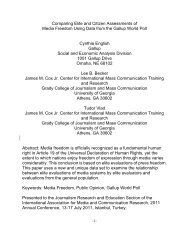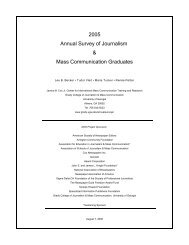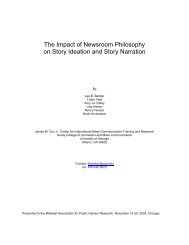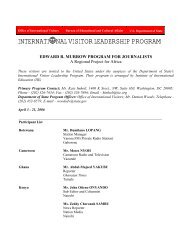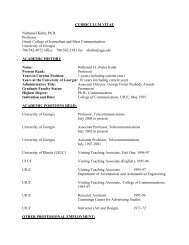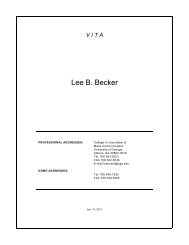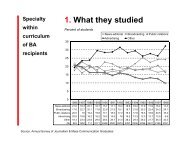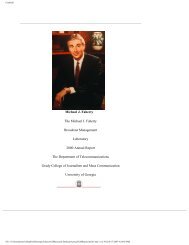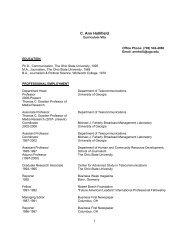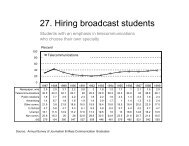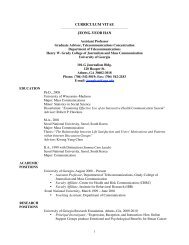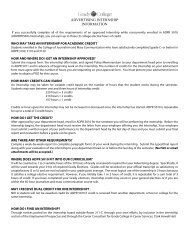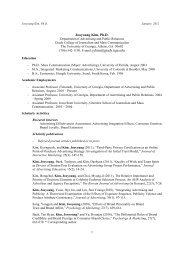Professionalism of News Workers - Grady College of Journalism and ...
Professionalism of News Workers - Grady College of Journalism and ...
Professionalism of News Workers - Grady College of Journalism and ...
Create successful ePaper yourself
Turn your PDF publications into a flip-book with our unique Google optimized e-Paper software.
<strong>Pr<strong>of</strong>essionalism</strong> <strong>of</strong> <strong>News</strong> <strong>Workers</strong>: The Creation <strong>and</strong> Evolution <strong>of</strong> the Concept Page 14<br />
Wright found that more than half the journalists surveyed showed high pr<strong>of</strong>essional orientation in some<br />
areas, contrary to the Canadian government’s report <strong>of</strong> a lack <strong>of</strong> journalistic pr<strong>of</strong>essionalism.<br />
The literature is not consistent in the definition <strong>and</strong> interpretation <strong>of</strong> pr<strong>of</strong>essional communicator<br />
as a concept. The French researchers have in mind a broad range <strong>of</strong> occupations:<br />
What do I underst<strong>and</strong> by ‘pr<strong>of</strong>essionals’? My perspective is broad. I include here<br />
those who are within the institution: directors, producers, production personnel,<br />
journalists, <strong>and</strong> engineers. Those who are on the top, even for a short time: the<br />
general managers, their desk staff, their representatives, <strong>and</strong> also the ministers<br />
<strong>of</strong> Communication <strong>and</strong> their predecessors, <strong>and</strong> also the ministers <strong>of</strong> Information,<br />
which are much more influential. I am also thinking <strong>of</strong> those who are external,<br />
but whose opinion matters: members <strong>of</strong> the parliament, <strong>and</strong> especially those<br />
who write many reports on which, step by step, the opinion <strong>of</strong> the political class<br />
is built upon. Eventually, the journalists working for specialized media are not<br />
the last to distribute what has been previously achieved in the pr<strong>of</strong>essional <strong>and</strong><br />
political fields. (C.J. Bertr<strong>and</strong> & F. Bordat, 1989, p. 171-172. The original version<br />
in French.)<br />
In studying Swedish journalists, Windahl <strong>and</strong> Rosengren (1976) differentiated between<br />
individual pr<strong>of</strong>essionalization <strong>and</strong> collective pr<strong>of</strong>essionalization. They defined individual<br />
pr<strong>of</strong>essionalization as a form <strong>of</strong> socialization, <strong>and</strong> collective pr<strong>of</strong>essionalization as a process that<br />
involves the pr<strong>of</strong>ession as a whole. The article analyzed only the collective pr<strong>of</strong>essionalization <strong>of</strong><br />
Swedish journalism by examining: the pr<strong>of</strong>essional attributes <strong>of</strong> the existence <strong>of</strong> a pr<strong>of</strong>essional<br />
organization; specialized education <strong>and</strong> training; a code <strong>of</strong> ethics; degree <strong>of</strong> autonomy; a claim <strong>of</strong><br />
monopoly over certain types <strong>of</strong> work; <strong>and</strong> the expression <strong>of</strong> a service ideal. Looking at these collective<br />
criteria, they found that Swedish journalists were “striving towards a pr<strong>of</strong>essional status” but journalism<br />
had not been fully realized as a pr<strong>of</strong>ession.<br />
Tunstall (1971), based on his survey <strong>of</strong> 207 correspondents at 23 British national news<br />
organizations, questioned whether British journalists were part <strong>of</strong> a pr<strong>of</strong>ession.



